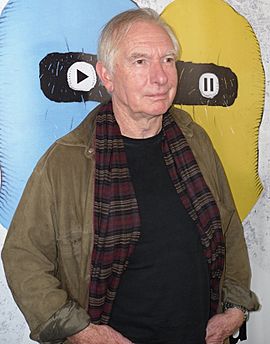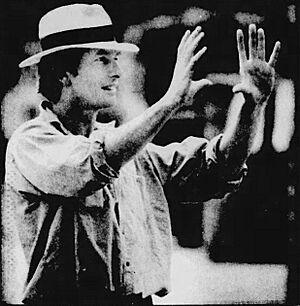Peter Weir facts for kids
Peter Weir is a famous Australian film director. He was born on August 21, 1944, in Sydney, Australia. Peter Weir is known for making many different types of movies over 40 years.
Some of his most well-known films include Picnic at Hanging Rock (1975), Gallipoli (1981), Dead Poets Society (1989), and The Truman Show (1998). He has been nominated for six Academy Awards, which are also known as the Oscars. In 2022, he received a special Academy Award for his amazing work in movies throughout his life. He also received a lifetime achievement award at the Venice Film Festival in 2024.
Early in his career, Peter Weir was a key person in the Australian New Wave film movement. This was a time from the 1970s to the 1990s when Australian movies became very popular. He directed his first full movie, Homesdale, in 1971. He then made other important films like the mystery Picnic at Hanging Rock and the historical drama Gallipoli.
After these successes, Weir directed many popular American and international films. These movies covered different genres, from thrillers to comedies and historical dramas. Many of them were big hits at the box office. His last movie before he retired was The Way Back in 2010.
Contents
Early Life and Education
Peter Lindsay Weir was born in Sydney, Australia, in 1944. His father, Lindsay Weir, was a real estate agent. Peter went to The Scots College and Vaucluse Boys High School. Later, he studied arts and law at the University of Sydney.
He became interested in filmmaking after meeting other students. These students included Phillip Noyce and members of the Sydney filmmaking group Ubu Films.
Peter Weir's Film Career
Starting in the 1960s
After university in the mid-1960s, Peter Weir started working at a TV station in Sydney called ATN-7. He helped produce a funny TV show called The Mavis Bramston Show. During this time, he used the station's equipment to make his first short films. These were experimental movies like Count Vim's Last Exercise.
In 1969, Peter Weir and his friend, composer Peter Best, were asked to create a TV show for ABC Television. It was a Christmas special called Man on a Green Bike.
Movies in the 1970s
Weir then worked for the Commonwealth Film Unit, which made documentaries. He directed several documentaries and a part of a three-film project called 3 to Go (1970). This project won an award. Another film he made was about rock music, showing bands like Spectrum.
His first big independent film was Homesdale (1971). It was a dark comedy. Weir also had a small role in it, but it was his last time acting in a major way.
First Full-Length Films
Weir's first full movie was The Cars That Ate Paris (1974). This was a low-budget dark comedy. It was about a small town where people caused car crashes on purpose to make money. The idea for the movie came from a news story Weir read about two women who disappeared in France.
Many of Weir's films are about people who feel separated from society. They face challenges when they are isolated. This can be physically, socially, or even mentally.
International Success with Picnic
Peter Weir's big breakthrough was Picnic at Hanging Rock (1975). This movie was a beautiful and mysterious story. It was made with help from the South Australian Film Corporation. The film is set in 1900 and tells the story of schoolgirls who disappear during a picnic.
Picnic at Hanging Rock was very important for Australian cinema. It was one of the first Australian films to get great reviews and be shown in many countries. It also helped the career of famous Australian cameraman Russell Boyd.
Exploring New Themes
Weir's next film was The Last Wave (1977). This was a supernatural thriller. It starred American actor Richard Chamberlain. The movie explored how native Aboriginal culture and European culture interact. It also starred Aboriginal actor David Gulpilil.
Between films, Weir wrote and directed a TV movie called The Plumber (1979). It was a dark comedy about a woman whose life is disturbed by a plumber.
Films in the 1980s
Weir had another big hit with the historical adventure Gallipoli (1981). This film is considered a classic Australian movie. It helped make Mel Gibson a major star.
The peak of Weir's early career was The Year of Living Dangerously (1982). This movie also starred Mel Gibson, along with Sigourney Weaver. It was about journalists in Indonesia in 1965. Linda Hunt won an Oscar for her role in this film.
Moving to Hollywood
Weir's first American film was the successful thriller Witness (1985). This movie starred Harrison Ford. It was about a young boy who sees a murder and has to hide in an Amish community. Weir was nominated for an Academy Award for Best Director for this film. Witness also won two other Oscars.
He then directed The Mosquito Coast (1986). This film starred Harrison Ford as a man who wants to start a new life in the jungle. These movies helped Harrison Ford show he could play many different kinds of characters.
Dead Poets Society Success
Weir's next film, Dead Poets Society, was a huge international success. It starred Robin Williams, who was known for his comedy. In this movie, Williams played an inspiring teacher at a strict school in the 1950s. The film was nominated for four Oscars, including Best Picture and Best Director for Weir. It won an Oscar for Best Original Screenplay. This movie also helped start the careers of young actors like Ethan Hawke.
Movies in the 1990s
Weir directed his first romantic comedy, Green Card (1990). It starred French actor Gérard Depardieu in his first English-speaking role. The film was a box-office hit. Weir was nominated for an Oscar for his original screenplay.
Fearless (1993) was a darker film. It starred Jeff Bridges as a man who feels invincible after surviving a plane crash. Rosie Perez was nominated for an Oscar for her role in this movie.
The Truman Show
After five years, Weir directed his biggest success, The Truman Show (1998). This fantasy film was a satire about how media can control life. It starred Jim Carrey. The Truman Show was a big hit with both audiences and critics. It received many awards and three Academy Award nominations. Weir himself was nominated for Best Director.
Films in the 2000s and 2010s
In 2003, Weir returned to historical dramas with Master and Commander: The Far Side of the World. This movie starred Russell Crowe. It was based on adventure books set during the Napoleonic Wars. The film was well-liked by critics and won two Oscars for cinematography and sound.
In 2010, Weir released The Way Back. This historical epic was about people escaping from a Soviet prison camp. The film received good reviews.
Retirement and Recognition
In July 2022, actor Ethan Hawke suggested that Peter Weir had lost interest in making movies. In November 2022, Weir received a special Academy Honorary Award from the Academy of Motion Picture Arts and Sciences.
In an interview, Weir confirmed his retirement. He said that directors, like volcanoes, go through active, dormant, and extinct stages. He believes he has reached the extinct stage. He enjoys visiting old ruins and battlefields in his retirement.
Personal Life
On June 14, 1982, Peter Weir was given the title of Member of the Order of Australia (AM). This was for his important contributions to the film industry.
Peter Weir's Films
| Year | Title | Distributor |
|---|---|---|
| 1971 | Homesdale | |
| 1974 | The Cars That Ate Paris | British Empire Films |
| 1975 | Picnic at Hanging Rock | |
| 1977 | The Last Wave | United Artists |
| 1979 | The Plumber | |
| 1981 | Gallipoli | Village Roadshow / Paramount Pictures |
| 1982 | The Year of Living Dangerously | United International Pictures / MGM/UA Entertainment Company |
| 1985 | Witness | Paramount Pictures |
| 1986 | The Mosquito Coast | Warner Bros. |
| 1989 | Dead Poets Society | Buena Vista Pictures |
| 1990 | Green Card | |
| 1993 | Fearless | Warner Bros. |
| 1998 | The Truman Show | Paramount Pictures |
| 2003 | Master and Commander: The Far Side of the World | 20th Century Fox |
| 2010 | The Way Back | Newmarket Films / Exclusive Film Distribution / Meteor Pictures |
Awards and Nominations
Peter Weir has received many awards and nominations throughout his career. He has been nominated for six Academy Awards (Oscars). In 2022, he received an honorary Oscar for his lifetime achievements in film.
Some of his films have won major awards:
- Picnic at Hanging Rock won a BAFTA Award.
- The Year of Living Dangerously won an Academy Award for Best Supporting Actress (Linda Hunt).
- Witness won two Academy Awards.
- Dead Poets Society won an Academy Award for Best Original Screenplay and two BAFTA Awards.
- Green Card won two Golden Globe Awards.
- The Truman Show won three BAFTA Awards and three Golden Globe Awards.
- Master and Commander: The Far Side of the World won two Academy Awards and four BAFTA Awards.
See also
 In Spanish: Peter Weir para niños
In Spanish: Peter Weir para niños
 | Emma Amos |
 | Edward Mitchell Bannister |
 | Larry D. Alexander |
 | Ernie Barnes |




